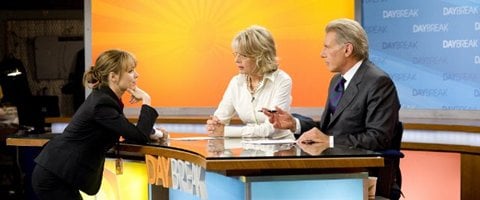It’s fitting the story of a harmless and cutely awkward news executive would play well in the hands of an ensemble cast all banding together to present the morning news. A cutely awkward and -- above all -- energetic female lead juxtaposes nicely with the personas of on-camera news anchors with sleek, caffeinated smiles pasted on. When people are in these kinds of roles, they can be unforgettable, exciting. Morning Glory is just such a story. While Rachel McAdams is suited to play the energetic lead, and Harrison Ford and Diane Keaton capably rule the worlds of the bickering-yet-professional news anchors, Morning Glory -- a name taken, oddly enough, from a critical song in the musical Bye Bye Birdie -- suffers more from a forgettable name than a forgettable anything else. Morning Glory, coming from memorable writer Aline Brosh McKenna (Devil Wears Prada) and directed by Roger Michell, surrounds the life of budding New Jersey executive Becky Fuller, played by Rachel McAdams. Expecting a much-deserved promotion, Fuller attends a meeting with her boss, who promptly fires her, citing her lack of business finesse as an excuse to bring in someone with a more educated edge. After sending out a ton of feeler applications (and taking some undeserved criticism from her pessimistic mother), Fuller lands a position at IBS network’s morning show, "Daybreak."
Unfortunately, Daybreak is ranked last among the network ratings, and Fuller is tasked with fixing this problem. Absolving the ratings issues of a failing television program could never be easy, and Fuller’s first job is to sieve through a cast and crew as raucous and messy as I’d imagine the early seasons of SNL were, without much of the creativity. She fires lead Paul McVee (Ty Burrell), nearly on the spot, then hires a recently fired hardball anchor named Mike Pomeroy (Harrison Ford) in McVee’s place. Pomeroy comes unhappily and “for the money,” huffing his way into a new position and creating drama with fellow news anchor, Colleen Peck (Diane Keaton). Fuller never lets this dynamic make it onto the actual program, and thus Daybreak’s ratings begin to improve, in what is perhaps enough to save the show and give her career the big boost it needs.
It probably wouldn’t take much guesswork to figure out the rest of this plot. However, plot was never Morning Glory’s strength. Its boasts a perfectly sculpted script, driven by witty dialogue and supplemented by well-acted performances. Rachel McAdams is bankable, but Ford, who perfected bored in Return of the Jedi, is perfect for his role. Fuller’s secondary producer, Lenny Bergman (John Pankow), especially deserves credit here for his underrated delivery of such gems as “all on the ghost of Edward R. Murrow” in the moments before Pomeroy does the news for the first time. The Wit!
If we were a miser of an audience, we could go after a few nitpicky issues, like the implausibility of certain side characters' behaviors, the socially clueless behavior of Fuller occasionally delving too close to autism, and the completely improper use of Jeff Goldblum. Regardless, these little things are nothing but pinpricks on an otherwise seamless surface. Morning Glory is a good movie: for a feel-good comedy with an ensemble cast, it is maybe great. I guess it all comes back to the old argument about the importance of the serious stuff over entertainment, and with Morning Glory entertainment wins out. I can’t even tell you how disappointed I was with this disc. If I didn’t give a base level 1 star for at least having special features, the rating for this thing would look dismal. I know Morning Glory lost a little money in the theater, but to not even attempt to give audiences some nice special features is selfish and doing a disservice to the people who watch those things and who were pleasantly surprised with the film.
The first extra is a deleted scene between Peck and McVee. The scene is short and exhibits the same sort of relationship that is shown in the film between Peck and Pomeroy. The scene was fine, but I can see why it was cut. It doesn’t seem like it could have really fit much of anywhere.
The second feature is commentary between writer McKenna and Michell. This is fine; you gain some insight into her writing and his movie-making process, but it’s a shame you never hear from any of the actors who are so integral to the film. Commentary is always best when there is one from the creators and a separate commentary from the actors. However, Morning Glory doesn’t even offer any sort of interviews as an alternative. The disc sort of missed the boat on this one.
Your Daily Blend of Entertainment News

